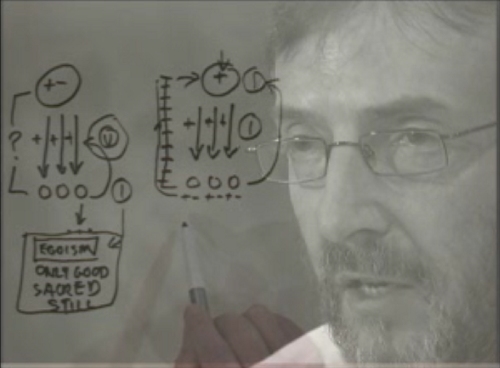
This post has no answers and only doubts, but reading it you’d see what is that Kabbalah is (or wants to be). This is an “answer” to the 12th self-study lesson (a introductory study) and it contains my doubts about it. To see the self-study you’d have to register here, for free. There are 14 lessons in that self-study.
I’ve also included the 12th lesson (about 25 minutes) if one doesn’t want to go through that registration, but I actually encourage you to register and watch the rest as it’s all quite interesting and at least enriching.
—
I was rewatching lesson 12 of the self-study and got some doubts. I know that Kabbalah can’t be understood simply logically, but as long I’m not “there” I still have to relate to it with my own logic and the ideas I get from the lessons.
It seems to me that the difference between Kabbalah and other religions is not the one described in that video. The difference I understand is that Kabbalah is entirely about spirituality, so it isn’t interested about the physical world. This marks a true difference with all other religions as all religions (as far as I know) do have systems of rules that apply to corporeality. From what you can or can’t eat to when and how you should pray. Even anthropologically all religions were “meant” to regulate the corporeal world and build a certain society.
But instead I can’t stop my doubts about what is explained in the video. I only know well Christianity since it’s where I’m born but, while the people could certainly believe that it’s about “bribing God”, that’s not a good representation of that religion, and the real one isn’t very different from how the Kabbalistic model is described.
The part that gives me the doubts is that one could say that the Kabbalistic process is equally “delusional”. As long the upper light is invariable and the events also invariable (so what changes is solely the self), then it means that the pain itself can’t be stopped or diverted. The pain is instead “understood”, as one, through bestowal, would perceive the “long range”, so the wider purpose beside the egoistical self.
Which essentially would lead one to “endure” the pains of life in the name of a greater purpose that says: there’s indeed a purpose, and it is good willed. One could see his sons killed in front of him, or go through great pains, but always knowing that there’s a “meaning”, and that life is eternal.
So it is true that the suffering is always relative to a perspective, and if one shifts the perspective a momentary suffering becomes bearable. Through life eternal all suffering is bearable as it is momentary. But both these ideas are essentially “consolatory” and Kabbalah would be defined itself as consolatory, as it is all based on two principles that regulate the rest:
1- That life is eternal (and so suffering momentary)
2- That God is good willed, and everything happens for a purpose
If one had the CERTAINTY of those two points, then it is true that pain would be bearable. But isn’t this perspective consolatory and delusional? As you can’t change what happens to you (invariable upper light and events) you have to “endure” it, hoping there’s a good willed purpose even when everything looks very bleak.
The other difference between the Kabbalah and religion is that in religion the salvation or the enlightenment, more often than not, happen after death. So they are “promises” of salvation or enlightenment, and one lives with the “hope” that they are true, clinging desperately to these ideas as they can only justify the pain of life, and give life a sense.
Kabbalah is different as the promise of attaining the “upper world” is here and right now. You say it’s a “science” as it has to be experienced and attained personally, first hand. It’s not a theory or an abstract idea. But the skepticism here is about “when”. One listens to the video courses, reads the books and slowly understands what is Kabbalah, but what’s that ideal point that brings back up to that “tangible certainty”? The distinguishable certainty that Kabbalah is a science and not a consolatory delusion?
I’m explaining the subjective point of view: one comes to Kabbalah trying to learn, but learning leads me to define these ideas of life eternal and purpose as “consolatory”. This can only be solved through a certainty. In other religion you achieve that certainty through “faith”, but in Kabbalah faith is not required, as having doubts and asking questions is encouraged (as in science). I am right there.